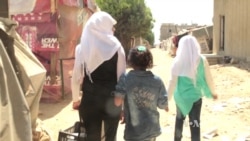Child labor was a problem in Lebanon before the arrival of Syrian refugees Now, it's worse.
As money for humanitarian aid begins to run out, some observers fear child labor could become even more widespread in Lebanon. Refugee families often depend on the money their children earn. So there are no easy answers.
Non-governmental organizations are working to bring children into the Lebanese education system. And the United Nations has developed guidance that it hopes will help young people reclaim their childhood.
Children are often paid just three or four dollars for a day of work. Yasmine Deeb is a refugee from Syria.
"Why should mama work on her own? I’d get upset. I wanted to help my mother, also sometime when she’s ill, she also can’t work.”
The 12-year-old girl and her family are preparing garlic for restaurants because they need the money. Before that, they did very physical work: gathering potatoes from the ground.
Kalima Deeb, Yasmine’s mother, says that before the war in Syria, her family worked in farming. Back then, she remembers, she and her husband earned enough money to send their children to school.
“You know every child has their own dreams and ambitions. I didn’t imagine that they would come out of school and be subjected to such work and fatigue.”
Thousands of Lebanese and Syrian children are working in the agriculture and on the streets. Many people fear the problem will worsen.
Syrian refugees are receiving less humanitarian aid now compared to one or two years ago. They are being forced to pay fees for living in Lebanon, and the government restricts what jobs they can take.
Two UN organizations -- the International Labor Organization and the Food and Agriculture Organization -- have launched campaigns to help tell about the danger of some jobs for children.
Dr. Rana al-Barati Tabbana is a public health specialist.
“Child labor affects all those facets in growth and development of children, and has very serious detrimental effects on their quality of life, health and well-being -- both in the short term and in the long term.”
A local non-governmental organization called Beyond Association is helping Yasmine and her three sisters.
They are among 450 children in the area who are being educated in the morning before they go to work. The organization hopes the children will one day attend school and not be part of the workforce.
Layla Assi works at Beyond Association.
“We’re trying to work with those children step-by-step to let them go out from work, and when they come here, their dream is to have education. Now they dream to be a lawyer, to be a doctor..."
Because some children work to provide food for their families, ending child labor is not easy. The young people in the Beyond Association program are just a small percentage of those who are working. But as they return to their home, Yasmine and her sisters are given the chance to see a better future.
I’m Caty Weaver.
John Owens reported this story from the Bekaa Valley in Lebanon. Christopher Jones-Cruise adapted the report for VOA Learning English. George Grow was the editor.
We want to hear from you. Write to us in the Comments Section, or visit our Facebook page.
_____________________________________________________________
Words in This Story
upset – adj. angry or unhappy
ill – adj. not well or healthy; sick or unhealthy
ambition – n. a particular goal or aim; something that a person hopes to do or achieve
fatigue – n. the state of being very tired; extreme weariness
facet – n. a part or element of something
detrimental – adj. causing damage or injury
impact – n. a powerful or major influence or effect





